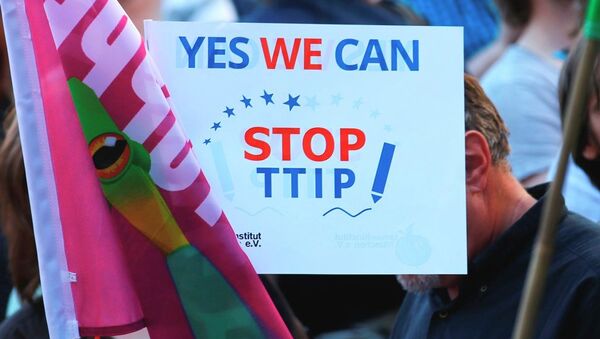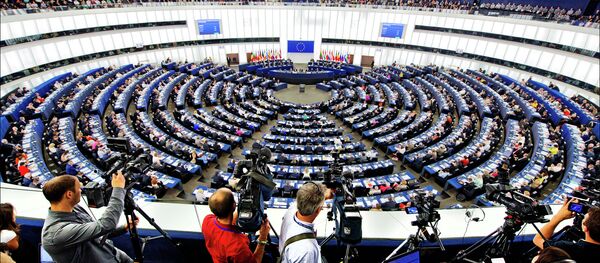The highly divisive nature of a proposed TTIP was demonstrated yesterday afternoon, when a vote on the EU-US trade agreement was postponed by the European Parliament due to divisions between major party groups.
The reasons for the last minute delay allegedly to related amendments made to the proposal that meant MEPs needed more time to consider the deal, which opponents say will only benefit big corporations rather than citizens.
TTIP Would Reduce Workers’ Rights, Safety Standards
Along with widespread public opposition towards any prospective TTIP, unions have been steadfast in their opposition to the proposals, saying that consumer rights, food quality standards and even Britain’s NHS could be under threat, unless the trade deal excludes public services and legally protects the people that use them.
— War on Want (@WarOnWant) June 10, 2015
Its negotiated in secret & designed by big business. Please sign this petition NO NHS IN TTIP http://t.co/aGS7AqQQyl pic.twitter.com/0vjFljmc0T
— Bevanknewbest (@Bevanknewbest) June 10, 2015
Dave Prentis, general secretary of UK union UNISON, who represents more than one million public service workers, said there is a fear a potential TTIP would place even more strain on services and make it harder for the UK to regulate private companies involved in the provision of private services.
"Britain will be held to ransom by foreign companies unless the European Parliament sends a clear signal that all public services are to be excluded from any trade deal. Otherwise, it won't be long before American multi-nationals are providing social care and running the NHS and academy chains on a grand scale."
Mr Prentis said he fears such an agreement would lead to a number of issues for European workers, given that the TTIP would try to regulate a blanket rule for health and safety standards across Europe and the US.
"The US has lower protections for consumers, workers, health and safety and the environment, which would put European companies at a disadvantage, and increase pressure on the EU to weaken regulations. The knock on effect would be a decrease in the quality of public services, lower wages, and less protection for consumers and the environment."
Critics also fear that due to differences in employment rights standards between the EU and US, trade unions would have less power to support their workers, while employees would have fewer opportunities to challenge legal breaches in employment contracts.
TTIP Opposition Should Be 'Taken Seriously'
The secrecy of TTIP negotiations, along with the leaked proposals of the agreement, have drawn widespread criticism from both the general public and public service operators, sparking several protests against the measures.
The opposition to the proposals has also triggered the ‘Stop TTIP’ campaign, which recently secured a record two million signatures to try and place pressure on politicians to prevent the deal from going through.
The @eci_ttip reached 2 million signatures! Congratulations & let's celebrate! http://t.co/oWGcDYVi79 #StopTTIP #CETA pic.twitter.com/pohSE0CpA7
— Stop TTIP (@eci_ttip) June 8, 2015
Although the upcoming European Parliament vote on whether to approve TTIP will not have a legal impact, Michael Elfer, Federal Chief Executive Officer of the 'More Democracy' association and member of Stop TTIP, told Sputnik it will have a significant impact on the final decision.
"This decision is not legally binding, but it can be quite important," he said, adding that "the European Commission will be guided by it."
In a warning to European politicians ahead of TTIP negotiations, Elfer also questioned whether those in power would want to risk alienating the public in supporting such plans, given the significant opposition to the proposed trade deal.
"I really have to consider whether the decision-makers in the European Union are really prepared, with increasing disenchantment with politics, to ignore such a result. I would say that it should be taken seriously as a political decision."



